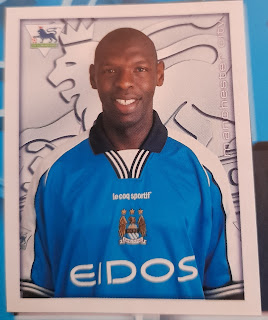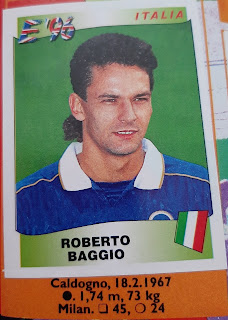267: Shaun Goater, Manchester City, Merlin’s F.A. Premier League 2001 Official Sticker Collection
Whatever field you work in you’ll find that you now use so many acronyms that you might have even forgotten what they stand for. When, for example, did you last hear NATO referred to as the North Atlantic Treaty Organisation? When you were last promising someone you’d complete an urgent task for them did you bother typing out, or saying for that matter, it would be done as soon as possible or did you just go for ASAP? Similarly I think we’ve no doubt all had the unpleasant experience where someone has actually said “LOL” and you’ve had to pretend that’s now socially acceptable.
In recent years sport has been infiltrated by one particular acronym which, prior to the mid-2010s, was synonymous only with irritating barnyard animals. It’s just about bearable in the endless Ronaldo v Messi debate where both players are clearly abnormally talented but a half-decent performance in the League Cup or anything to do with American Football should never lead to anyone being referred to as the ‘Greatest Of All Time’. When this becomes the acronym GOAT it also obscures the career of football’s original farmyard forward who arrived in England from Bermuda in 1989 at the expense of a prestigious scholarship in the US.
Shaun Goater was initially snapped up by Manchester United as a creative midfielder but moved on to Rotherham United for first team football. Despite initial issues with homesickness, and the South Yorkshire weather in particular, he slotted in 86 goals across 262 appearances helping the Millers to a Football League Trophy in 1996. The deterioration in his relationship with manager Archie Gemmill saw him move to Bristol City where, across a season and a half, he scored a very impressive 45 goals in 81 appearances in Division Two which attracted the attention of struggling Manchester City in the tier above. Despite starting the 1997/98 campaign as 6/1 second favourites to win the league City were in dire straits when Goater arrived at Maine Road in March 1998. The Bermudan managed three goals in the last seven games of the season but, in part due to Jamie Pollock’s spectacular own goal against Queen’s Park Rangers, City were relegated.
For younger readers, yes, this is the same Manchester City who boast a squad of international stars and have established themselves as one of the world’s biggest clubs. Back in 1998 they were embarking upon a first season in the third tier in their 106 year history and their suitably shell shocked supporters were sceptical about their most recent arrival’s ability in front of goal. Goater more than settled the City faithful with twenty goals in all competitions to fire his side into the play-offs and back into Division One at the first time of asking. He went one better with 29 goals in the 1999/2000 season to help City win back to back promotions and a place back at the Premier League top table. Back in Bermuda the striker’s homeland topped off his Player of the Year award by declaring June 21st ‘Shaun Goater Day’. Earlier in the year he had scored a hat-trick for the national team in a 5-1 victory over the British Virgin Islands but as I met a geezer on a stag do who had represented that particular international side I assume these celebrations had more to do with his dominance of the English Football League. After all the Maine Road faithful knew, and vociferously sang, “feed the Goat and he will score”.
Goater found his opportunities limited by injury and the arrival of Paulo Wanchope and George Weah but still managed eleven goals as City were relegated back to Division One. Clearly keen to re-establish himself as the side’s main goal threat he smashed in 32 goals to send City straight back up with strike partner Darren Huckerby also registering 26. Despite this the club splashed the cash on Nicolas Anelka and Jon Macken in order to ensure Premier League survival which limited Goater to just fourteen starts. He still managed seven goals, including three in two appearances against Manchester United. Having decided to move on at the end of the 2002/03 season, due to a mixture of limited game time and poor relationships with Anelka and manager Kevin Keegan, Goater was handed the captain’s armband for the club’s final game at Maine Road. Although City went down 1-0 to Southampton Goater left on a high following 103 goals in 212 appearances.
He moved on to Reading where John Madejski heralded his arrival as “the biggest (transfer) in (the) club’s history”. However, after the shock departure of manager Alan Pardew, Goater was considered surplus to requirement in his new boss Steve Coppell’s plans and, after a loan spell at Coventry City, moved on to Southend United for one last professional season. Here Goater helped to bring through young striker Freddy Eastwood, as well as scoring eleven times himself, as the Shrimpers gained promotion from League One to the Championship. His last appearance, against former club Bristol City, saw around 400 Manchester City fans make the journey to Roots Hall to witness a 1-0 victory for the home side. Manchester City might well be one of the darlings of modern world football with a squad packed with great players but for some there will only ever be one Goat.





Comments
Post a Comment